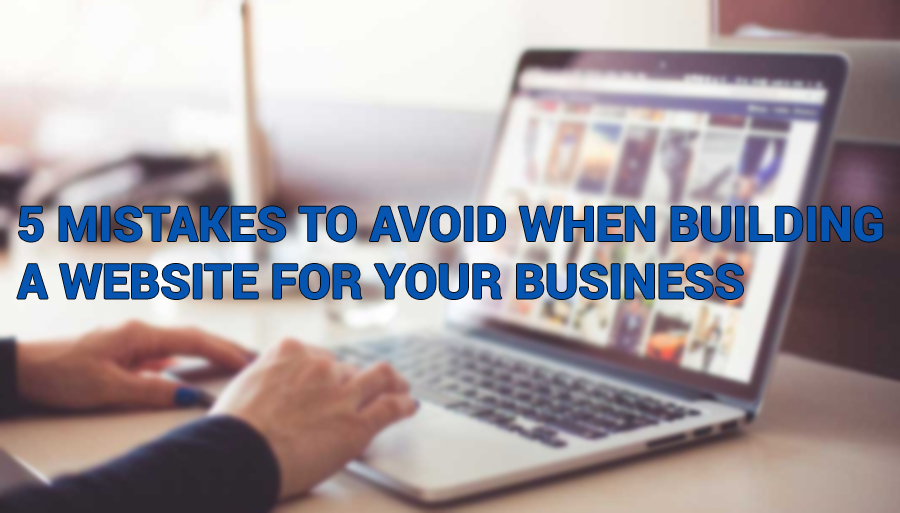5 Mistakes to Avoid When Building a Website for Your Business
Building a website for your business can be empowering. You are creating a tangible place where you will be able to engage with customers, make sales and begin to establish a reputation.

Building a website can also be overwhelming, though. There are many things to consider, it can take a hefty amount of time, and there tend to be endless ways to improve. There is also a fear of making errors that could have a dramatically negative impact on your business.
According to SocialDrift customer support agent, Alissa Verland, “mistakes on business websites upon foundation tend to be a leading indicator for poor inbound marketing.” To help mitigate the stress and maximize the effectiveness of your website, here are 5 mistakes you should make sure to avoid when building the site:
Not putting your time where it matters most.
It is often the case that when you are building a site, you do not have unlimited resources. There is only so much (if any) engineering and designer time available. Therefore, it is a big mistake not to be thoughtful about your approach, given the tools at your fingertips. If you do not have engineers, for example, then learning code from scratch instead of using a CMS (like WordPress, Squarespace, etc.) is likely a big time waste. The same can be said about building out designs if you have no designer.
The better and quicker approach is to make sure you set up Google Analytics. Then you can make changes based on metrics. See which pages are performing well or which version of an image has a greater desired impact. You can also use different tools, like FullStory or Crazy Egg to see exactly how users are interacting with a page.
Keeping track of this data and understanding where you can speed up the process will save you a drastic amount of time when establishing your site.
Slow site speeds.
This one seems obvious, but slow site speed is one of the biggest mistakes that you can make. People have very little patience for sites that take too long to load. When using a CMS, you can keep site speeds down with a few plugins. There are ones that will handle page caching and image compression.
That said, you do not want too many plugins since they weigh the site down. You can also be thoughtful about the way that images and javascript are loaded onto the site. There are free services that will instantaneously measure your site speed that can serve as good indicators.
When building your site, constantly be thinking about how certain decisions will impact page load time, since it can make the world of a difference.
Making the site confusing or difficult to navigate.
“When you cannot demonstrate the value of a particular section or piece of content on your website, then it should not be there,” says the founder of Calendar, John Rampton. It can be easy to get carried away with exciting designs, funky CSS or unique navigation bars.
When crafting a site, though, you should be very thoughtful about how you want your users to experience the site. Confusing or difficult sites lead to people not taking your desired action, leaving, and not coming back. Therefore, put every piece of information on the site with a specific purpose in mind.
Poor CTAs.
In tandem with making the site intuitive, you should include powerful call to actions (CTAs). With no CTAs, you are lowering the chances that your users will take your desired actions (like filling out a form or requesting a demo). Instead, be very thoughtful about what you are hoping a visitor is going to do during on your site. Then, when you are building the site, put CTAs in the right places. This will dramatically increase conversion rates and ultimately sales.
Not thinking about SEO.
From day one, you should be considering how your site will look to Google. Not doing so is a huge mistake. It will take away an organic search presence that you can create for yourself.
There are a few critical SEO factors to keep in mind as you begin creating your site. The first is that it needs to be optimized for mobile. Google places a harsh penalty on sites that do not work well with mobile phones. Plus, regardless of Google, a significant chunk of visitors are now coming via mobile. A bad mobile site can hurt you with potential customers. Another key is to make sure you avoid any broken links on the site.
This one is relatively simple, but as you are creating new pages and making edits, be thoughtful about the URLs to each page on your site. This is especially the case if you begin to change any of them.
Setting your website up in Google Search Console will get their crawlers to index pages. Plus, Google Search Console is a place to see things like organic traffic and crawler errors. That will enable you to keep the site effective and clean. Set up is quick and very high-impact.
The last place to take advantage of SEO upon site creation, if you have the bandwidth, is to create a blog. Content is one of the best drivers of organic traffic. As you are crafting your website from the ground up, creating a blog with powerful content can drastically improve your organic reach. Google will be indexing this content immediately. Therefore, as your site grows, that content can begin to rank highly for your desired searches.
